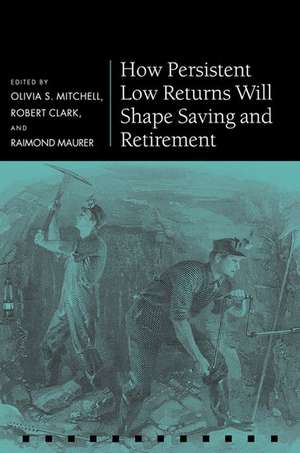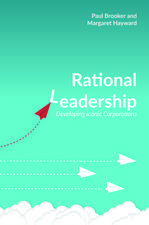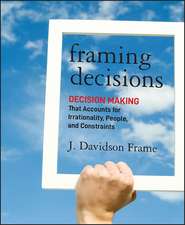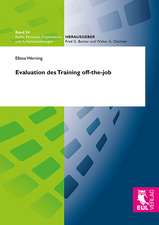How Persistent Low Returns Will Shape Saving and Retirement: Pension Research Council Series
Editat de Olivia S. Mitchell, Robert Clark, Raimond Maureren Limba Engleză Hardback – 6 sep 2018
Preț: 534.05 lei
Preț vechi: 765.26 lei
-30% Nou
Puncte Express: 801
Preț estimativ în valută:
102.19€ • 106.98$ • 84.56£
102.19€ • 106.98$ • 84.56£
Carte tipărită la comandă
Livrare economică 26 martie-01 aprilie
Preluare comenzi: 021 569.72.76
Specificații
ISBN-13: 9780198827443
ISBN-10: 019882744X
Pagini: 256
Dimensiuni: 163 x 236 x 19 mm
Greutate: 0.52 kg
Editura: OUP OXFORD
Colecția OUP Oxford
Seria Pension Research Council Series
Locul publicării:Oxford, United Kingdom
ISBN-10: 019882744X
Pagini: 256
Dimensiuni: 163 x 236 x 19 mm
Greutate: 0.52 kg
Editura: OUP OXFORD
Colecția OUP Oxford
Seria Pension Research Council Series
Locul publicării:Oxford, United Kingdom
Recenzii
The book responds to a number of years of low returns and makes one think about the extent to which longer-term history is a guide to the future. This book is central to the work of financial advisors because the interest-rate environment affects financial planning, retirement decisions, and investments
Notă biografică
Olivia S. Mitchell is the International Foundation of Employee Benefit Plans Professor, as well as Professor of Insurance/Risk Management and Business Economics/Policy; Executive Director of the Pension Research Council; and Director of the Boettner Center on Pensions and Retirement Research; all at the Wharton School of the University of Pennsylvania. Concurrently Dr. Mitchell serves as a Research Associate at the NBER; Independent Director on the Wells Fargo Fund Boards; Co-Investigator for the Health and Retirement Study at the University of Michigan; Member of the Executive Board for the Michigan Retirement Research Center; and Senior Scholar at the Singapore Management University. She also advises the Centre for Pensions and Superannuation UNSW and is Faculty Affiliate of the Wharton Public Policy Initiative. She received her MA and PhD degrees in Economics from the University of Wisconsin-Madison, and her BA in Economics from Harvard University.Robert Clark is Stephen Zelnak Professor of Economics and Professor of Management, Innovation and Entrepreneurship in the Poole College of Management, North Carolina State University. He is also Research Associate at the National Bureau of Economic Research and a member of the Advisory Board of the Pension Research Council. His research examines retirement decisions, the choice between defined benefit and defined contribution plans, the impact of pension conversions to defined contribution and cash balance plans, the role of information and communications on 401(k) contributions, and government regulation of pensions. He has also evaluated employer-provided financial literacy and retirement planning programs and how these plans affect worker decisions, as well as state and local pensions and retiree health plans. He earned his M.S. and PhD from Duke University, and his BA from Millsaps College in economics.Raimond Maurer is the Chair of Investment, Portfolio Management, and Pension Finance at the Finance Department of the Goethe University of Frankfurt. He is also Dean of the Faculty of Economics and Business Administration. His research focuses on asset management, life-time portfolio choice, real estate, and pension finance. Previously he visited the Wharton School as a Metzler Vising Professor, and he serves in several professional capacities including the Union Real Estate Investment group, the Society of Actuaries (academic chairman of AFIR), the Association of Certified International Investment Analysts (academic director and member of the International Examination Committee). He earned his Habilitation, PhD, and Diploma in business administration from Mannheim University, and he received an honorary doctorate from the State University of Finance and Economics of St. Petersburg.
















